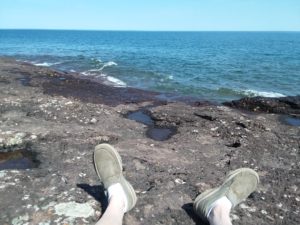
This is the first selfie I’ve ever taken. The body of water in front of me is Lake Superior, and, as you can see, I’m sprawled out on some rocks with a great view of the lake and horizon. What you can’t see is that I’m propped up against a big, smooth rock, using a light jacket as a makeshift pillow. I’m reading a mystery with enough of a plot to keep me engaged, but not so much that I can’t also listen to the waves and savor the sunlight. On a 1-10 scale of relaxation, I’m at a 10.
Nice, but there’s nothing seemingly memorable about any of this, except that for years getting a 2 on the relaxation scale would have been a dream for me. I lived with the kind of depression that never turns off. Tapes were always running in the back of my mind, never letting me forget that I was a failure, a fraud and a coward. They were especially good at keeping me informed about all the ways that I had let people down and shown myself to be somebody you couldn’t count on. They never let me relax. Besides, as these tapes made abundantly clear, I didn’t deserve to relax.
After many years of therapy, after learning new ways of coping, after learning to take seriously our faith’s words of forgiveness and grace – I’ve learned to relax. I can lie sprawled out on the shore of the big lake, read a book solely for pleasure, and be at peace with the world and with myself. For me, this is what mental health recovery looks like.
Given who I am, I find myself wanting to say, “Yes, but. . .” to this. and justify my relaxing. Yes, I’m taking time for myself, but I do lots of volunteer work, I’m active in my church, I’m politically active, I write books and articles about depression, I write for this blog etc., etc. It’s a natural tendency for me to feel that I need to justify myself when I take a break. Now years into recovery, I recognize this tendency, smile because I know it so well, and then I let it slide on by and out of my mind, not letting it interfere with my relaxing. These days, I’m trying to be in a mental place where I don’t feel the need to justify not being productive or contributing all the time. I’m learning to be OK with just lying out there on the rocks for a while, looking at the lake and being at peace.
I’m reminded of a few words from the 23rd Psalm that I learned as a child, “Thou restoreth my soul.” When I’m sprawled out by the lake, I’m giving God time to restore my soul. Given the challenging times in which we live, given the further challenge of mental illness – my soul yearns to be restored from time to time, or in less lofty language, I need to do nothing, and I need to be able to do nothing without feeling guilty about it. God can take it from there.
Again the temptation to justify myself pops up in my mind: I need to relax just as much as I need to sleep and eat. That’s absolutely true. If you don’t or can’t relax – the way life was for me in the depth of my depression – then you’ll spend your days hurting, and whatever you do will reflex the hurt you feel. It’s an awful place to be in. So if you need to justify relaxing as a physical and mental necessity, then I encourage you to do so.
But again, I want to get to a place where no justification is needed, where I can relax because that’s what I want to do, because I’m listening to my soul, translating “soul” here as “my inner being”, “my center”, who I am when I’m truly myself. That’s a 10 on the relaxation scale. It’s also about self-respect and self-worth. For me this is what mental health recovery feels like.

Bob Griggs
Ordained in 1973, Bob Griggs has served UCC churches in Massachusetts, New Hampshire, and Minnesota. He is an Advisory Council member at Vail Place, a club house for people living with mental illness. He is also the author of A Pelican of the Wilderness: Depression, Psalms, Ministry, and Movies and Recovering from Depression: Forty-Nine Helps.